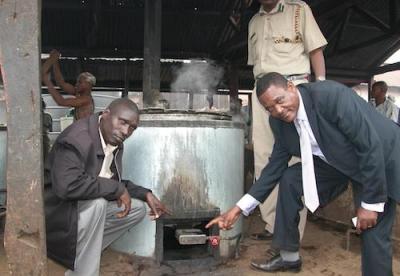Nairobi, Kenya:
With shortages of power and rising costs of fuels, Embu prison in Kenya has turned to human excrement to generate power.
Bio-gas now fuels three boilers in the prison kitchen, and firewood costs have been cut down by more than half. Many hope the innovative form of recycling and generating power could be applied in not only all prisons across the country but also in other institutions to significantly reduce energy bills.
Waste not, want not
To generate power, human waste is put into a machine called the "digester" and bio-gas is produced by bacteria during a 30-day fermentation period. The gas, which consists mainly of methane, is then captured and burnt as fuel.
Once the bio-gas has been produced and stored in the collection chamber, the remaining slurry is pushed out through the outlet of the dry bend. There the remaining water is purified and the slurry is later released to the farm.
Benjamin Kiprono, bio-gas project co-ordinator at the prison headquarters, told Think Africa Press that they now divert all human waste at the prison to their 124 cubic meter digester. “The digester requires constant flow of the human waste, and we have diverted all our toilets. We no longer dispose of our waste,” he explains. “The manure is odourless, and one cannot believe it’s from human waste. We also use the manure for our crops at the prison.”
The water released from the final chamber can also be used for irrigation, cleaning, and, if treated, even for drinking. “The water was tested by the Ministry of Water, but we just want to treat it further for our domestic use,” says Kiprono.
Saving a penny, and more
The cost of constructing a bio-gas facility ranges from $714 to $60,000 depending on the size of the digester and desired use of the bio-gas. Many, however, insist that this initial expenditure is justified and that the benefits accrued far outweigh the costs.
Francis Makathimo, Director of Prisons Enterprises and the person who introduced bio-gas to Kenya after seeing a similar project up and running in Rwanda, says: “We want to improve our stations all over the country, and through such projects, the government is going to save millions of shillings being spent on wood fuel”.
As seen in Embu prison, however, the potential benefits can extend beyond money-saving. “Although there is a high cost for bio-gas procurement and installation, it can play an important role in energy and environmental conservation, improve the health of women and children, and enhance household livelihoods”, Kiprono explains.
In terms of health improvements, Makathimo says, “we had witnessed cases where inmates suffered from ailments caused by smoke from wood fuel in the prison kitchen – nowadays we don’t experience such complaints”. Stephen Mwangi, an inmate and father of three, echoes this. “The environment was so unfriendly to us, inmates were also complaining of respiratory problems…we no longer complain of breathing and chest problems”, he says. Makathimo also adds that the bio-gas project has “tremendously reduced” diarrhoea cases which were prevalent due to the frequency with which inmates came into contact with human waste while disposing of it from buckets and basins.
The project has also opened doors for inmates to acquire new skills that will help them after their jail terms. Makathimo explains, “the whole work is done by the inmates themselves. Through such training, they are going to secure employment and also boost the country’s economy.”
Finally, the human waste scheme has created awareness around environmentally-friendly alternatives to cutting down trees. “This bio-gas project has opened our minds", Makathimo explains, adding, "we have also taken the initiative to educate the inmates on the importance of conserving the environment”.
Solid progress
Unable to ignore the positive impact of bio-gas production therefore, hundreds of thousands of dollars have reportedly been set aside by the Kenyan government to construct bio-gas projects in all prisons across the country and Makathino is hopeful that the idea can also be implemented in schools and other institutions with big populations. “If this project is rolled to other institutions, cases of power rationing and blackouts will be a thing of the past – it is a noble technology which must be embraced by everyone”, he says.
While applauding the many benefits of using bio-gas, however, George Nyamu, Programme Coordinator for the Kenya National Domestic Biogas Programme (KENDBIP), also warns of the consequences of over-production. “It is only advisable to generate enough gas, since under-utilised gas can be released into the ozone layer, and thus contribute to climate change,” he explains. Nyamu insists that this risk can, however, be managed if all institutions with bio-gas facilities purchase balloons to store the excess gas produced.
Many people may be uncomfortable with the thought of human waste energy systems, and would rather not think about what happens down the pipelines. But as humanity becomes increasingly demanding of energy, embracing unconventional methods of producing power may well be necessary.
thinkafricapress.com



